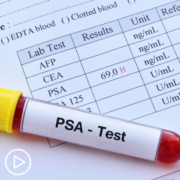How Can Prostate Cancer Stigmas and Misconceptions Be Addressed?
How Can Prostate Cancer Stigmas and Misconceptions Be Addressed? from Patient Empowerment Network on Vimeo.
How can prostate cancer stigmas and misconceptions be addressed? Expert Dr. Yaw Nyame with the University of Washington discusses common concerns and misconceptions, how doctor-patient communication can help, and support resources to aid patients and care partners.
See More from [ACT]IVATED Prostate Cancer
Related Resources:

Understanding Recommended PSA Screening Age and Frequency In Prostate Cancer |

|

What Impact Does Advanced Prostate Cancer Have on Lifestyle? |
Transcript:
Lisa Hatfield:
Dr. Nyame, have you encountered any misconceptions or stigmas related to prostate cancer within the underrepresented communities, and how do you address or mitigate these issues with your patients?
Dr. Yaw Nyame:
I think that there are a lot of misconceptions in all communities and stigmas around prostate cancer and its treatments, all the way from the early portion of diagnosis, stigma around maybe the rectal examination if you need one, take me around what may happen if you get a biopsy, misconceptions of biopsy, like will it spread the cancer all around your body, will it affect erectile function. And then through treatments. And so one of the primary jobs I feel like I have as a doctor who specializes in this area, is to take the time to hear patients express these concerns, do not diminish or belittle misconceptions, to really hear them, and then to try and educate and inform people about the realities without over-correcting either.
So someone comes to me and says, “Well, Doc, I hear that if I have surgery, I’m going to have erectile function.” I can’t, I shouldn’t, and I don’t say, Oh, you’re wrong, right? But I might say, “Well, that’s true. If you have poor erections before surgery, a likelihood that they’re going to get better is really low, and they’re likely to go away or diminish, but if you have good erections, that there’s a chance with certain techniques that they can come back and will come back.”And then I usually put something like 50 percent of men who have surgery and/or radiation will have some erectile dysfunction within the five years following their treatment. So it’s important to have a level ground where we share information candidly.
And I think it’s important for patients to come prepared to have these discussions, do your homework by talking to your people in your circles, by looking at trusted resources online from places like the American Cancer Society, Prostate Cancer Foundation, cancer centers produce their own information and be prepared to have these discussions.
My activation tip is the same as before, I think that building a community of survivors to share your concerns with and to get knowledge from is really important because there is no better source of information than the lived experience, and I think those individuals, especially the ones who volunteer to lead support groups and to share their stories, they’re wanting to impart their experience with other folks to empower them and support them, so it’s usually a really fantastic community to support understanding your diagnosis and what your journey is going to be like better and also a place to go to once you’ve experienced some of these things, right? It’s not just about the misconceptions up front and stigmas up front, but post-diagnosis and treatment, there are other concerns that may come up, and having the right network can sometimes help you navigate finding the solutions and the resources that are going to support you best.



